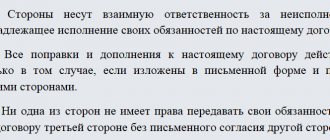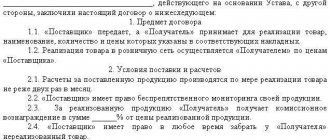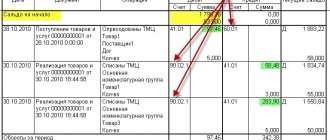What features does the document have?
At the time of completion of a transaction with the participation of third parties, commission agents, by agreement, assume part of the responsibilities . They also acquire the rights to certain actions.
The document may or may not indicate a validity period . The same applies to the territory of execution, the range of goods that become the subject of the commission.
When starting a business, it is mandatory to create a current account. For information on opening a current account for individual entrepreneurs, see the link.
Commission agents are party number one. They have a set of responsibilities associated with concluding one or several transactions that are necessary for the other party.
Such agreements are similar to orders, both in appearance and in effect . In each case, there is a performer who performs certain actions at the expense of the guarantor. And in the interests of the latter.
Agreements of this kind are needed to ensure that mediation activities are constantly monitored.
Scheme of work under a commission agreement.
https://youtu.be/tP-jXO2uUsc
Legal features of the contract
The principal is the owner (manufacturer, supplier of goods), and the commission agent is an intermediary who undertakes to find buyers for a certain fee. It is he who is directly involved in the implementation of the purchase and sale transaction. Moreover, in all such transactions, he personally assumes all rights and obligations arising from the relevant agreements with a third party.
The Civil Code directly states that the validity period of the document may not be specified. At the same time, it is important for the principal to understand that if the deadline was specified, but the commission agent never sold the goods (in whole or in part), his duties to find customers cease. In this case, it is necessary to extend the contract by signing an additional agreement.
In cases where the principal is an individual, several features of document preparation should be taken into account:
- The text must reflect the condition of the product - its wear and tear, the presence/absence of damage, a detailed description of the appearance.
- They also describe the grounds and procedure for a possible price reduction.
- Finally, the condition on the period of sale (before and after the markdown) should also be reflected.
How to draw up a commission agreement for the sale of goods: basic details
Commission agents independently determine the type in which the contract is drawn up. A number of information must be present in it.
- The time the document was compiled, its name.
- Details of the parties, their names . This data includes a passport or other identification document, the commission agent’s telephone number, bank account and address.
- Name of product.
- Disadvantages and degree of wear for goods that have already been used.
- Amount of cost.
- Remuneration for the commission, its amount along with the payment procedure.
- A set of conditions under which a product is accepted for commission.
- Features of markdown of goods, procedure for carrying out the procedure.
- The time frame within which the goods must be sold, before or after markdown.
- Features of the situation when the commission agent failed to sell the goods.
- Data on settlements between the parties.
- Conditions for payment for goods in storage.
Where can I get a contract?
A sample commission agreement for the sale of goods can be downloaded from this link.
Sample commission agreement for the sale of goods.
Other terms of the commission agreement
Such conditions make it possible to regulate relations between the parties in detail. Their difference from mandatory conditions is that their absence in the text of the contract does not entail its invalidity. Let us name the most common terms of a commission agreement that are not considered essential, but which are recommended to be included in the text of the agreement.
Term. The parties may agree in the agreement on the duration of the agreement as a whole, as well as the period for carrying out transactions. Both deadlines must be agreed upon. In this case, the participants in the legal relationship will receive a clear idea of what time they are obliged to take actions in the name of fulfilling the contract, when it must be fully executed. It follows from the concept of a contract that the commission agent may be entrusted with the obligation to complete not only one, but also several transactions. If there are several transactions, this must be stated in the text, as well as the timing of their completion.
Reimbursement of commission agent's expenses. A commission agreement, in addition to remuneration, may provide for compensation to the commission agent for costs incurred in fulfilling obligations (Article 1001 of the Civil Code of the Russian Federation). Costs are determined by the parties to the contract. For example, the committee may compensate the other party for the costs incurred in traveling to the location of the transaction. Costs may be included in the award amount. This must be stated in the contract. The Civil Code of the Russian Federation does not provide for a procedure for reimbursement of costs, so the parties independently regulate this issue. For example, you can define the form of payment, reimbursement periods, stages, etc.
Condition on the territory of execution of the contract. According to Art. 990 of the Civil Code of the Russian Federation, a clause related to the territory of execution of the contract can be included in the commission agreement. This clause limits the place where the commission agent enters into transactions under the agreement, for example, the territory of a constituent entity of the Russian Federation.
Condition for acceptance of what is performed under the contract. The Committee is obliged to accept what has been fulfilled under the contract. In practice, this means that the principal must accept back things not sold during the transaction, as well as those purchased for him.
Conditions on the commission agent's report. According to Art. 999 of the Civil Code of the Russian Federation, after the commission agent executes the order, he must provide the other party with a report on the work performed. In addition, transfer to him everything that he received during the execution of the contract from third parties, for example, it could be things or money. The text of the agreement may also stipulate the commission agent’s obligation to provide the other party with documents that are evidence of expenses during the fulfillment of obligations. The report is provided in the form of a written document and is addressed to the principal in any way specified in the contract.
Participants in a legal relationship can set the frequency of the report. It is recommended to agree on a condition under which the report is provided at least once every 30 days. The receipt by the committent of information about the activities of the second party will allow him to minimize the costs associated with paying taxes. In Art. 999 of the Civil Code of the Russian Federation states that if the committent has any controversial situations related to the information in the report, he must notify the other party of his disagreement within 30 days. This deadline for filing objections can be changed by agreement between the parties, either up or down. This provision must be stated in the text of the agreement. If the committent has not sent his objections to the report within 30 days, it is considered that he has fully accepted it.
Condition for notifying the principal of the actions taken. It is logical to indicate in the commission agreement a condition under which the commission agent must regularly notify the principal of the transactions that he has completed. For example, about the facts of shipment of goods sold to him within the commission and advances that were received by him.
Since the 25th day of the month following the quarter is the deadline for paying VAT, it would be good if information on shipped goods was provided by the commission agent in advance (for example, before the 15th day). This gives the committent time to analyze the information received. It is not prohibited by the terms of the contract to oblige the agent to provide such information immediately after shipment of the goods or receipt of an advance payment. It is advisable to include a provision regarding this in contracts that have a validity period of several months. For shorter contract periods, the principal usually receives all data in a timely manner, without additional conditions.
The commission agent can report that the goods or products have been shipped, as well as that the buyer has received an advance payment, using a simple written report, as well as through other documents. For example, this could be a delivery note, as well as an invoice.
Legal regulation of agreements
The Civil Code of the Russian Federation is the basis that largely regulates commission agreements. For example, paragraph 1 of Article 990. In addition, chapters 51-52 are important in this matter.
Many enterprises only pay wages; the advance is included in this amount. You can receive an advance upon a corresponding application. A sample application for an advance payment can be found at the link.
When working with a document, they rely on Article 996 of the Civil Code of the Russian Federation. The same applies to Article 23 of the Civil Code of the Russian Federation. And article 991, 993, 997, 936, 999.
How to conclude this agreement correctly?
To conclude a contract, a simple written form is used, which means that one party has entered into a deal with the other. The second party to the document performs actions in the interests of the first.
The legislation does not contain special requirements for the status of each party in the legal field. They are any citizens who take part in commodity-money circulation. This applies to both legal entities and individuals.
There are some points that will help you avoid difficult and controversial situations.
- What rewards do commission agents receive?
Commission agreements are included in the group of remunerative transactions. Commission agents receive rewards for their actions. He receives additional compensation when the transaction is carried out by third parties, and he himself vouches for them.
Commission agreements must include the full amounts of fees, methods and terms of payment. It is imperative to challenge this data.
- Question about reimbursement of expenses incurred by the contractor under commission agreements.
The Civil Code mentions the obligation of principals to pay commission agents; work is not performed at the expense of the latter. Therefore, reimbursement of transaction costs falls on the shoulders of the customers. There is only one exception to a rule allowed. Expenses related to the storage of property received from the second party are not subject to compensation .
- Facts related to additional benefit. When it is distributed.
The commission agent must do everything possible to ensure that the work is carried out to obtain the maximum benefit for the principal .
If the conditions are more favorable than those initially specified by the principals, the conclusion of transactions is permissible.
An example of a completed commission agreement.
What other factors deserve attention?
issue of the possibility of subcommission agreements with the participation of commission agents deserves special consideration . They can be deprived of such a right if the relevant clause in the contract is indicated in a timely manner. And the first party will not be able to enter into relations with other performers until the main agreements expire.
The validity period is indicated in the contract or not indicated. If the deadline is not written, then the termination of the contract is notified no later than 30 days before the official decision.
The principals have the right to refuse to continue the relationship at any time. Commission agents have the right to terminate agreements, but they are allowed to act only within the framework of current legislation .
Why do you need certificate 182 and how to fill it out correctly? Full information on this issue is in this article.
When purchasing goods
The commission agent is obliged to provide the other party with an invoice or the data that was specified in it by the buyer. An invoice for intermediaries is issued by the principal , who issues it in two copies.
When the goods are shipped, the commission agent draws up a report and then transmits it to the consignor . It is good if it is possible to transfer copies of documents transferred to buyers.
At the same time, the remuneration is taken into account, and an invoice is issued for its amount.
Commission agreement form
There is no provision in the Civil Code of the Russian Federation that would impose a requirement on the form of the agreement in question. Unless a different procedure is provided for by law or regulations, the said agreement is subject to the general provisions on the form of transactions (Civil Code of the Russian Federation, Articles 158-165, 434 of the Civil Code of the Russian Federation). In many cases, the agreement is concluded in the form of a written document in two copies. The commission agreement does not require the participation of a notary and registration by state authorized bodies.
Commissioners' reports
When commission agents complete fulfillment of obligations, principals must receive reporting forms. Everything that the commission agent received according to the agreement is transferred to the principal .
If the principals have objections, they can forward them to the commission agents no later than 30 days after receiving the report. The report is considered accepted if there are no counter-objections.
The main thing is that the committent himself receives the report on time . Otherwise, there is a possibility of paying VAT later than required by law. This obligation does not depend on the fact of transfer of funds in connection with the agreement.
The commission agent must notify customers of the receipt of goods and the transfer of payment for them.
The text of the legislation does not clearly state the period within which the second party must receive a message regarding the process of selling goods . But late notifications are associated with serious consequences for principals.
When applying for a job, they are often asked to provide a certificate of no criminal record. Where to get it and how to fill it out - read the link.
That is why the deadline for receiving the report must be discussed in all details in advance, by specifying the time in the contract. The presence of penalties will be an additional incentive for commission agents to fulfill their duties on time.
Registration of the commission agent's report in 1C.
https://youtu.be/qlymtFLuQDw
COMMISSION AGREEMENT FOR THE SALES OF GOODS
_______________ “___” __________ 200__
_____________________________________________________, hereinafter referred to as___
“Committent”, represented by ________________________________________________, acting
(position, surname, first name, patronymic)
on the basis of _________________________________________________, on the one hand,
(Charter, power of attorney)
And _____________________________________________________________________________,
(name of enterprise, institution, organization)
hereinafter referred to as___ “Commission Agent”, represented by _________________________________,
(position, full name)
acting on the basis _____________________________________________________,
(Charter, regulations, power of attorney)
the other parties, hereinafter referred to as the “Parties”, have entered into this Agreement as follows:
1. The Subject of the Agreement
1.1. The Principal instructs, and the Commission Agent undertakes to carry out, for a fee, under the terms of this Agreement on his own behalf, but in the interests and at the expense of the Principal, transactions for the sale of goods transferred to him by the Principal: _____________________________________________________ (hereinafter referred to as the Goods).
1.2. The goods are transferred to the Commissioner in batches in the quantity and assortment agreed upon by the Parties in additional agreements to this Agreement. Additional agreements also establish the minimum selling price for each unit of the Goods, the period during which from the moment of receipt of the Goods the Commission Agent undertakes to sell the Goods, as well as the cases and procedure for returning the Goods to the Principal.
One batch of Goods cannot be less than ___________ and more than _______.
2. Rights and Obligations of the parties
2.1. The commission agent is obliged:
2.1.1. Accept the Goods and sales documents for them according to the acceptance certificate -
transfer of the Goods. When accepting Goods with defects, reflect such defects in the Goods acceptance certificate.
2.1.2. Conduct a search for buyers for the Goods on terms that are most favorable to the Principal and at a price not lower than the one set by the latter.
2.1.3. Sell the Goods on the terms provided for in the additional agreements of the Parties.
2.1.4. Assess the prospects for the sale of the Goods of the Principal and notify the latter of the period within which it is necessary to agree on the terms of sale of the next batch of Goods.
2.1.5. Inform the Principal about the progress of execution of instructions under this Agreement. Based on the results of the sale of each batch of Goods, provide the Principal with written reports indicating the actual sales price of the Goods no later than ____ day from the date of sale of the next batch of Goods in full. The report must be accompanied by a calculation of the Commissioner's remuneration and a breakdown of the expenses incurred by him in pursuance of this Agreement, as well as the necessary evidence of such expenses.
2.1.6. Agree with the Principal the expenses necessary for the execution of this Agreement.
2.1.7. Within ____ days from the date of sale of the next batch of Goods, transfer to the Principal the proceeds from the sale of the Goods, minus your remuneration and expenses agreed upon by the Parties in Article 3 of this Agreement.
2.2. The commission agent has the right:
2.2.1. When accepting the Goods from the Principal, at your own expense, inspect the Goods for their quality, quantity and ___________________.
2.2.2. Refuse to perform the Agreement if the Principal does not fulfill or improperly fulfills its obligations, including obligations to pay the Commission Agent remuneration and pay his expenses.
2.3. The principal is obliged:
2.3.1. On your own and at your own expense, provide the Goods at the disposal of the Commission
Nera.
Place of delivery of the Goods: _____________________________________________________.
The deadline for the transfer of each batch of Goods is agreed upon by the Parties in additional agreements establishing the quantity, assortment, price and other indicators of the batch of Goods transferred for sale.
2.3.2. Accept the reports of the Principal and, if there are any objections to them, report them to the Commissioner within ___________ days from the date of receipt of the report. Otherwise, the reports are considered accepted by the Principal.
2.3.3. Pay the Commissioner's expenses in the manner agreed upon by the Parties in Article 3 of this Agreement.
2.3.4. Pay commission to the Commissioner in the manner, amount and on the terms agreed by the Parties in Article 3 of this Agreement.
3. Commissioner's remuneration. Payment procedure
3.1. The Commission Agent's remuneration is ____% of the actual sale price of each batch of the Principal's Goods.
3.2. Remuneration to the Commission Agent for the sale of the next batch of Goods is paid by the latter withholding the amount of remuneration due to him from the amount received from the sale of the next batch of Goods in full, subject to the provision of a written report to the Principal in accordance with clause 2.1.5 of this Agreement.
3.3. The Commissioner's expenses, previously agreed upon with the Principal, are reimbursed to the Commissioner by deducting the latter from the amount received from the sale of the next batch of Goods in full, subject to the provision of a written report to the Principal in accordance with clause 2.1.5 of this Agreement.
3.4. Unforeseen expenses of the Commissioner, not previously agreed upon with the Principal, are reimbursed by the Principal within _____ days from the date of their approval. With the consent of the Principal, such expenses may also be reimbursed to the Commission Agent by deducting the latter amount from the amount received from the sale of the next batch of Goods in full.
By agreement of the Parties, amounts intended to cover the expenses of the Commissioner may be paid by the Principal in advance.
4. Responsibility of the Parties
4.1. If the Principal is late in paying the Commission Agent's expenses, the Principal shall pay the Commission Agent a penalty in the amount of _________% of the overdue amount of debt for each day of delay.
4.2. If the Commission Agent fails to provide the Principal with a report within the time period agreed upon by the Parties in clause 2.1.5 of this Agreement, the Principal shall pay a penalty in the amount of ____% for each day of delay from the price of the consignment of Goods on the sale of which the report agreed upon by the Parties in the additional agreement establishing the conditions has not been provided sales of such a batch of Goods.
4.3. If there is a delay in transferring to the Principal the amount of proceeds from the sale of the next batch of Goods, in accordance with clause 2.1.7 of this Agreement, the Commission Agent shall pay a penalty in the amount of ________% of the amount to be transferred for each day of delay.
4.4. In case of failure to comply with the deadline for the sale of the next batch of Goods, agreed in the additional agreement of the Parties on such batch of the Goods, the amount of the Commissioner's remuneration is reduced by ____________ for each day of delay in sales
Product.
5. Force majeure circumstances
5.1. The Parties are released from liability for failure to fulfill or improper fulfillment of their obligations under this Agreement in the event of force majeure circumstances directly or indirectly preventing the execution of this Agreement, that is, such circumstances that are independent of the will of the Parties and could not have been foreseen by them at the time of conclusion of the Agreement and prevented by reasonable means when they occur.
5.2. The circumstances specified in clause 5.1 of the Agreement include: war and hostilities, uprising, epidemics, earthquakes, floods, acts of government authorities directly affecting the subject of this Agreement, and other events that the competent court recognizes and declares as cases of force majeure.
5.3. The Party affected by such circumstances is obliged to immediately notify the other Party in writing of the occurrence, type and possible duration of the relevant circumstances.
5.4. The occurrence of the circumstances provided for in this article, subject to compliance with the requirements of clause 5.3 of this Agreement, extends the period for fulfilling contractual obligations for a period that generally corresponds to the duration of the occurrence of the circumstance and a reasonable period for its elimination.
5.5. If the circumstances provided for in this article last more than _____ months, the Parties will jointly determine the further legal fate of this Agreement.
6. Final provisions
6.1. This Agreement comes into force from the moment of its signing and is valid until the Parties fully fulfill their obligations.
6.2. Disputes and disagreements arising from this Agreement or in connection with it will be resolved by the Parties through negotiations. If no agreement is reached, the dispute is referred to the arbitration court.
6.3. Any changes and additions to this Agreement are valid only if they are in writing and signed by the Parties.
6.4. Any additions, protocols, annexes to this Agreement become its integral parts from the moment of their signing.
6.5. In everything that is not specified in this Agreement, the Parties are guided by the current legislation of the Russian Federation.
6.6. This Agreement is drawn up in two copies having equal legal force, one copy for each of the Parties.
7. Addresses and bank details of the Parties
Signatures of the parties:











